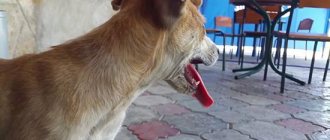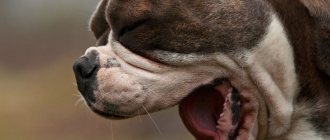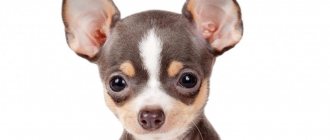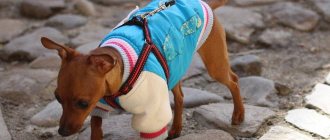Unpretentious, curious, brave and devoted to the tip of the tail to the owner - all this is about the Chihuahua.
The charming dogs owe the name of their breed to the state of the same name in Mexico - it is believed that their homeland is there. There is a lot of evidence of this, especially in art.
Chihuahuas live a long time and practically do not get sick; they do not have to visit the veterinarian often.
However, there are important points that both those who are planning to have a pet and those who already have a dog of this breed in their home need to know.
We will talk about one such moment in our article, namely, why a Chihuahua grunts and snores.
Why does the dog grunt?
The main feature of the Chihuahua breed that is important to know about is its very short and pointed muzzle. Because of this structure, the dog has “reverse breathing” - an irritated palate provokes a spasm of the pharynx. This syndrome is also called “reverse sneezing.”
Many owners are seriously frightened by such manifestations of their pets - the animal can suddenly strongly stretch its neck, tense its chest muscles, and strongly arch its back. At the same time, the Chihuahua convulsively gasps for air, wheezes and makes loud grunting sounds, as if he is suffocating.
Don't be afraid when your pet grunts through his nose - this is how he tries to restrain himself in order to start breathing normally again. Some owners are touched by pets that make such funny sounds.
IMPORTANT!
You have to be on your guard - there are times when Chihuahuas begin to choke. It’s better to prevent trouble - monitor your pet’s health so that he doesn’t get sick, overexcited or sad, because all these reasons can provoke strong grunting.
When should you contact a veterinarian?
The cause of wheezing may lie not only in the structural features of the respiratory system. You should seek help from a veterinarian if alarming symptoms appear:
- Attacks are occurring more frequently and lasting more than two minutes – heart disease is possible.
- Shortness of breath due to excess weight.
- Copious nasal discharge – acute, infectious or allergic rhinitis.
- Loss of consciousness - suffocation due to poisoning, asthma, heat stroke, vasospasm, injury.
According to veterinarians, the reason why a Chihuahua constantly sneezes, grunts, groans and breathes heavily may be an inflammatory process or an allergy. To make a diagnosis, the dog is taken to the clinic and undergoes a full examination.
Main reasons
When dogs grunt, they try to clear their airways. There are many reasons why this can happen - the reins are too tight, strong odors, powder getting into the nose.
It happens that a pet sneezes when it is very happy or eats food faster than usual. Another reason is problems with the sky. Your pet may have a cleft or a soft or drooping palate.
There are more serious reasons - for example, serious health problems . It could be a tick, various infections, polyps in the mouth. Therefore, if your pet grunts with enviable regularity, then you should definitely show it to the veterinarian. Without timely assistance, the dog may get worse.
A heart attack is the most dangerous cause of grunting. The first thing that is important to pay attention to is the language. If he turns blue, the dog should be taken to the vet immediately.
Another problem that can cause a baby to “grunt” is obesity, so you need to monitor your Chihuahua’s diet and prevent the dog from overeating.
This problem is discussed in many veterinary forums. Doctors recommend carefully monitoring your pet’s condition, because dogs cannot talk about what’s bothering them. Therefore, all hope lies in the owner, who will sound the alarm in time, will not let the situation take its course, and will show the Chihuahua to a specialist.
Read here what foods you can feed your Chihuahua.
It is not always possible to independently diagnose the cause of grunting, so it is better to entrust the examination to a professional.
NOTE!
As veterinarians note, a dog that frequently grunts may have an inflammatory process, severe allergies, or collapse of the trachea.
Are these conditions dangerous for Chihuahuas?
A normal cough and sneeze ends quickly. It can be compared to the sounds a cat makes when coughing up fur. If the attack stops and the animal behaves as usual, there is no reason to worry.
It happens that a Chihuahua continues to make strange sounds for more than a minute and cannot calm down. In this case, help is needed.
It is worth taking your dog to the vet if the attacks have become not only prolonged, but also regular. One of the most serious causes of grunting is diseases of the cardiovascular system. You should pay attention to the color of the tongue. If he turns blue, you need to urgently seek help from a veterinarian.
What to do?
One simple but proven method will probably help. The dog needs to be placed on the floor or table, the main thing is that the surface should be flat. Gently massage your back in a clockwise direction. It is important to lightly support the Chihuahua under the tummy. You can lightly run your hand over your pet's throat to help him swallow.
Another option is to close your nostrils with your fingers. The dog will inhale air through its mouth and swallow saliva, as it will not be able to breathe through its nose.
Has your pet started to choke? First, check to see if your pet is choking—there may be something sticking out of her mouth. Then the foreign object must be carefully removed.
There is another way. Rub the bridge of your pet's nose, press on the wings of the nose, and then press on the root of the tongue. The dog may resist and start barking - this will also help open the way for oxygen.
Chihuahua owners recommend giving dogs antihistamines if they grunt frequently - this reduces the intensity of attacks. However, it is better not to self-medicate, but to consult a veterinarian. The specialist will tell you which product is best for your pet and recommend the correct dose.
When does a Chihuahua have a coughing or wheezing attack?
This symptom almost never occurs when the dog is at rest. Spasmodic breathing occurs during:
- emotional overexcitation of the animal;
- walking on a leash if the dog breaks from it;
- in a state of high physical activity;
- extreme heat;
- stress;
- inhalation of strong odors.
Chihuahua owners should remember that the breed is not suitable for hunting or too active games. It is important to avoid situations that are stressful for the animal. When walking, it is better to wear a harness instead of a collar. In the hot season, walk for a short time, mostly in the shade.
Why does my pet snore?
Chihuahuas not only grunt, but also snore and sometimes do it so loudly that they do not allow their owners to fall asleep.
Snoring itself does not affect the animal’s life in any way, but it can be a signal to the owner that the pet may have a serious illness. Owners of dogs of some breeds may be seriously alarmed. But in a number of pets, snoring is associated with physiology, just like grunting - its cause is a shortened muzzle.
Is there any point in worrying if a Chihuahua snores not from time to time, but regularly? If your pet snores only at night while sleeping, then you should not be upset, but if strange sounds begin to appear suddenly during the day and do not go away for a long time, then this is a reason to sound the alarm.
There can be many reasons for snoring. One of the most popular is improper dog nutrition. Your pet will likely need a special diet.
It is worth taking measurements of the humidity at home to understand whether such conditions are suitable for the dog - perhaps its mucous membranes dry out during sleep.
IMPORTANT!
If a pet snores heavily, owners of dogs of this breed recommend taking their Chihauhua to a veterinarian so that he can understand the reasons and rule out serious diseases.
Vaccinations
When is the time for the first vaccine?
The first vaccination is given to the puppy at the age of 8 weeks. It will protect against:
- viral enteritis;
- parainfluenza;
- leptospirosis;
- plague and adenovirus.
For puppies
When a puppy comes into a person's home, he needs to see a veterinarian. The doctor will recommend a drug that will then protect the miniature dog from all infectious diseases.
For rabies
Rabies vaccination is administered to dogs from 1 year of age.
Vaccination table by age
| Chihuahua age. | Name of the vaccine. |
| 2 months. | The drug DHPPI+Lepto or Nobivak Lepto. |
| 3 months. | Repeat the first vaccination. |
| 4 months. | Repeat the first and second vaccinations. |
| 12 months. | The drug Eurican LR. This is a rabies vaccine. |
Vaccination after 3 years
Here the drug Puppy DP is administered (but this is at the request of the owner). It helps protect your dog from:
- carnivore plague;
- adenoviral hepatitis;
- respiratory tract adenovirus;
- parvovirus enteritis;
- parainfluenza.
Symptoms of a cold
Viral and acute catarrhal rhinitis develops in three stages, with characteristic symptoms for each2:
1. Unpleasant tension and itching in the nose occur, which are accompanied by sneezing. Watery nasal discharge appears as a protective reaction of the mucous membrane to uncomfortable atmospheric conditions or the penetration of viruses. As well as fever, headache, general weakness.
2. Swelling of the mucous membrane occurs, making nasal breathing difficult and a nasal voice appearing. The perception of smells decreases, up to anosmia (loss of smell). Elevated temperature, lethargy, and drowsiness persist.
3. Nasal congestion persists, especially at night, which disturbs sleep. The color and consistency of nasal discharge changes (it becomes thick and acquires a yellow-greenish tint). Difficult-to-remove exudate causes congestion in the ears when blowing the nose, and a moderate headache.
With timely, competent treatment, a cold runny nose goes away in 7-10 days. Neglect of treatment leads to the spread of inflammation into the sinuses, auditory tube, and bronchi. Accordingly, complications such as rhinosinusitis, otitis media, and bronchitis develop.
Nasal congestion during pregnancy
This is a very common problem associated with hormonal changes in women during this period.
Typically, rhinitis in women during pregnancy belongs to the group of non-infectious runny noses - vasomotor rhinitis (unless, of course, the woman has a cold or an infectious disease).
The main symptom is that the nose alternates between one and the other nostril. Unpleasant symptoms cause a lot of inconvenience, often intensifying towards the end of the gestation period. To prevent overwork, chronic fatigue and other negative factors, you should use nasal decongestants without runny nose, approved for pregnant women.
Prevention of allergies and colds
To prevent allergic rhinitis, it is necessary to limit interaction with the irritant that causes symptoms of the disease and create a hypoallergenic environment6:
- install air filters in the house;
- change cotton and down bedding to padding polyester;
- get rid of potential dust accumulators (curtains, carpets, etc.);
- if necessary, part with pets;
- treat surfaces with acaricidal agents against dust mites.
Cold prevention involves strengthening the body's defenses and maintaining a high level of immune status. Preventive measures include:
- hardening, systematic sports;
- a healthy diet rich in vitamins, probiotics and proteins;
- regular ventilation of premises;
- vaccination;
- maintaining personal hygiene.
If the epidemiological situation is unfavorable, social contacts should be limited and a protective medical mask should be worn.
Negative
- Monogamous people: they tend to become attached to only one person in the family.
- They may become jealous of the owner's other pets or even children.
- They are very touchy and do not tolerate rough treatment.
- The increased emotionality of these dogs sometimes leads to uncontrolled urination in Chihuahuas in stressful situations.
- They need an individual approach to training.
- With improper upbringing or its complete absence, these dogs can turn into real domestic tyrants: stubborn, disobedient and even biting.
Diagnosis of respiratory organs
As a rule, diagnostics of the respiratory system is carried out according to the following scenario:
- Detailed external examination of the pet , paying attention, first of all, to the condition of all its visible mucous membranes and fur, as well as to the characteristics of breathing (even, intermittent, deep or superficial, etc.).
- Auscultation (listening) of the chest . It is so easy to identify moist rales, “seething” and gurgling in the lungs, and other important symptoms.
- Percussion of the chest (tapping). An experienced specialist can identify changes and shifts in the boundaries of internal organs (lungs and heart), and suggest the presence of fluid or air in the cavity.
History of the origin of the breed
The name of the breed comes from the name of the Mexican state of Chihuahua. Here began the story of the smallest dog, which then spread throughout North America. The ancestors of the modern Chihuahua are considered to be the Techichi, who in the 9th century. bred by Indian tribes - the Toltecs.
Completely mute, small dogs were raised by the Aborigines for food and as sacrifices to local gods.
When the Toltec tribes began to die out, the Aztecs took over the land. They continued breeding “edible” dogs. This business flourished until the conquistadors of Cortez entered the lands of America. After the fall of the Aztec Empire, difficult times came for dogs. The Spaniards practically exterminated the animals. The surviving Techichi went into the forests. Until the 19th century. I haven't heard anything about dogs. Later, traces of their descendants began to be discovered.
During that period, American tourists often came to Mexico. Local residents offered them an unusual souvenir - small pocket dogs. The animals had different colors. However, the miniature sizes remained unchanged. At first, dogs were named after the places where they were sold. For example, “Mexican” or “Arizona” breeds appeared. Gradually, small dogs began to be called Chihuahuas. Russians pronounce it "Chihuahua". Techichi descendants were included in the standards in 1904. Three years later, the animals crossed the ocean and ended up in Great Britain.
A small pocket dog was offered as a souvenir.
The breed standard was approved in 1923 in the USA. At that time, only short-haired types of Chihuahuas were recognized as purebred. Long-haired specimens became standard in 1954. In the USSR, Chihuahuas first appeared under N. S. Khrushchev. Fidel Castro gave the Secretary General the puppies. Soon the dogs Mushinka and Mishter ended up with the breeder Zharova, who began to control the breeding of the breed. The male became the founder of Russian pocket Chihuahuas. Puppies from him were born to another imported dog.
The fly was not suitable for breeding due to age and health.
However, the dog appeared in films. You can see this Mexican woman in the film “The Elusive Avengers.” The dog is sitting there in the arms of actor Sichkin.
We tried to find Narcissa another family.
Desperate to re-educate the dog, I even tried to find Narcissa another family. I really wanted the dog to have an owner who would spend a lot of time with him, take care of him, play with him, teach him, and dote on him.
And one day... we gave it away. But after 1.5 months Narcissus returned to us. He refused to eat, was bored, and also shit.
He came back and continues to dirty our sofa. We go crazy and he enjoys it. How to wean him off?
But recently we found a way out. When we leave, we cover the sofa with diapers and fill it with toys so that the dog doesn’t sneak in. It helps for now, but for how long? This is a very inventive creature!
Prevention measures
If, for example, a Spitz grunts and wheezes, as if it is suffocating, in order to avoid unpleasant symptoms you should:
- provide your pet with a balanced and varied diet;
- organize a room for keeping the dog so that it is warm, protected from winds and cold;
- do annual preventive deworming;
- double-check the sanitary and hygienic standards for keeping the animal.
A balanced diet is essential to maintaining your pet's health.
What symptoms should you be wary of?
If a Spitz is choking and grunting, the owner should be alerted to symptoms such as:
- cough;
- weight loss;
- dyspnea;
- vomit.
In this case, the breed of the dog that grunts does not matter. For any representative of four-legged animals, such symptoms will not be a joy.
A dog's cough is a good reason to visit a veterinary clinic.











